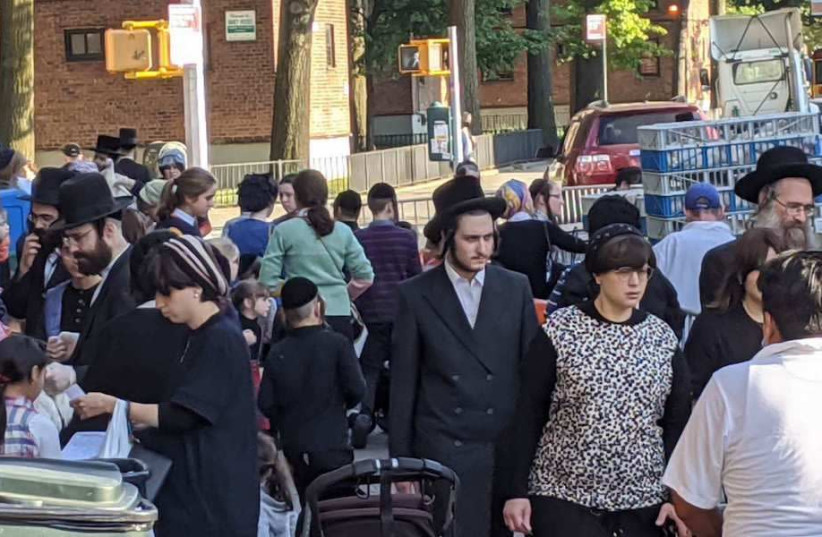I am of course in favor of strengthening Diaspora Jewry. As such I should give my blessing to the new Knesset caucus set up last week by MK Yitzhak Pindrus for just such a purpose.
Alongside the blessings, it is worth paying attention whom the caucus represents, and to what degree it actually reflects the Diaspora. The leadership of World Mizrachi should be paying special attention, as Pindrus has a focused strategy that pushes him in direct competition with them.
Obviously the meeting was opened by the caucus chair and founder, MK Pindrus of United Torah Judaism. Following him was the acting chair of the Jewish Agency and chair of the World Zionist Organization, Yaakov Hagoel of the Likud. The other speaker to open the proceedings was Rabbi Pesach Lerner, who serves as the head of the Eretz Hakodesh faction in the WZO. Best described in his own words at the meeting, Eretz Hakodesh was formed to represent the interests of American Haredim.
Among the rest of those who spoke, it was almost exclusively Haredi, including prominent Orthodox and Haredi organizations: Aish Hatorah, Chabad, the Orthodox Union and the European Conference of Rabbis. A longer presentation was made by the Israeli representative of the American organization Am Echad. Although Am Echad promotes Jewish unity, it is better described as a proxy for Agudath Israel of America. Its cochairs are both prominent Agudath activists, one of whom is chair of the Agudath Israel of America and the other chair of the same in Los Angeles.
Leah Aharoni of Am Echad presented the basic case for the caucus – the growing importance of the Haredi community in the Diaspora in general and the US community in particular. She presented the now standard and oft-repeated claims of the pending disappearance of non-Orthodox Jewry, mainly due to assimilation and intermarriage. Having said that, Aharoni, quoting the Pew statistics – reaffirmed that Orthodox Jews in the US represent about 9% of the community, about half of whom are Haredi.

No doubt that it’s right for their voices to be heard, but no reason to overstate their prominence, notwithstanding the demographic predictions. Of course, it is true that the relative size of the different denominations will change. Basing himself off Pew research, Yale researcher Dr. Edial Pinker predicts that in 2063 Orthodox and Haredim will together form 29% of American Jewry, while Reform and Conservative affiliated Jews will be 39%, a reduction from 50% today. It is of course also fair to say that the intensity of the lived Jewish experience of the Orthodox and especially Haredi Jews in the Diaspora is meaningfully different, and in favor of the Orthodox. Having said this, it is reflected in the shift predicted. The demographic shifts, if they play out as predicted, will have an enormous internal effect on the American Jewish community, and still, fifty years from now, the largest part of the American Jewish community, will be liberal.
Why then should the caucus be a cause for concern for other factions in world Jewry?
It forms part of a coordinated strategy, at the center of which is Pindrus and the Haredi leadership in Israel. He is the lynchpin behind the creation of Eretz Hakodesh, and Am Echad, both of which are effective Haredi proxies – one to block the influence of the non-Orthodox streams of Judaism within the WZO and Jewish Agency, and the other to act as an effective lobbying arm for them in the Knesset. This is of course legitimate, but should not be confused with any wider desire to represent the interests of the Diaspora as a whole. While the majority of Diaspora Jewry seeks changes to state and religion in Israel, this new alliance is absolutely against this, while the majority of American Jews seek a place they can call their own at the Western Wall, Am Echad and Eretz Hakodesh are campaigning strongly in opposition.
This new interest in Diaspora politics will change the dynamics that have existed up until now. The group most threatened by this within the WZO and Jewish Agency are World Mizrachi. The presence at the caucus launch of both the Orthodox Union and Yeshiva University (the latter participating silently) should be of concern to the leaders of World Mizrachi. Both of these hugely important religious institutions have traditionally formed part of the Mizrachi coalition within the national institutions. A possible shift towards the Haredi faction could undermine their position. This may seem esoteric to many readers, but the shift will also affect the balance of power on issues of state and religion in Israel, where the Haredi hegemony over religious affairs is under threat from Religious Services Minister Matan Kahane, and allocations of major budgets for Zionist and religious Zionist education, in Israel and the Diaspora.
When Pindrus talks about Jewish unity, he has a very specific image in mind, one which is very different to the vast majority of Diaspora Jewry. While it should not, and cannot be ignored, it needs to be understood for what it is, an extension of Israeli haredi politics.
Daniel Goldman is Founding Partner of Goldrock Capital and Founder of The Institute for Jewish and Zionist Research. He is a businessman and social activist. He currently co-chairs the Coalition for Haredi Employment and is a former chair of Gesher and World Bnei Akiva.
